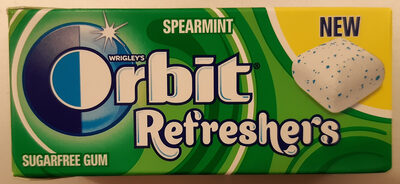
Barcode: 4009900535519
HALAL
📝 Reason: Based on the ingredients listed, most are Halal-certified or plant-derived. However, Gum Base, Flavorings, and Glycerol can be derived from both plant and animal sources or may use alcohol in processing. Without Halal certification or detailed sourcing, these ingredients are marked as Doubtful per Islamic dietary law (Quran 5:3). This means the product Halal_Result is 2 (Doubtful). References: IFANCA, www.halalfoodauthority.com.
🏷️ Category: Snacks, Sweet Snacks, Confectioneries, Chewing Gum, Sugar Free Chewing Gum
📄 Certificates: Low Or No Sugar, Contains A Source Of Phenylalanine, Excessive Consumption Can Have Laxative Effects, Green Dot, New, No Sugar, With Sweeteners, Vegetarisch
Ingredients:
Details
Understanding the Halal Status of This Chewing Gum
When it comes to choosing snacks, particularly in the confectionery category, many consumers are concerned about whether the products they enjoy meet Halal dietary requirements. This chewing gum, which is sugar-free, uses a variety of sweeteners and other ingredients that warrant a detailed investigation into its Halal status. With the product in question categorized under Snacks, Sweet Snacks, Confectioneries, Chewing Gum, Sugar Free Chewing Gum, we will dive deep into each component to analyze their origins and compliance with Halal standards.
Halal Certification of the Product
According to the information available, the overall Halal status of this chewing gum is deemed HALAL. However, it’s important to note that several ingredients are classified as ‘Doubtful’ due to potential animal sources or processing methods involving alcohol. This classification highlights the need for greater scrutiny needed in sourcing and certification.
Ingredient Breakdown and E-numbers
- Xylitol (Halal): A sugar alcohol extracted from plants like birch or corn. Usually considered Halal as it is plant-derived. Learn more.
- Sorbitol (Halal): Typically derived from plant sources such as corn or potatoes, this sugar alcohol is also recognized as Halal. More info here.
- Mannitol (Halal): Another sugar alcohol mainly obtained from plant sources, and is well acknowledged as Halal. Details here.
- Aspartame (Halal): An artificial sweetener made from amino acids, sourced from non-animal means, making it generally Halal. Read more.
- Sucralose (Halal): Synthesized from sucrose with no animal products involved—this sweetener is also Halal. Further details.
- Acesulfame K (Halal): A synthetic, non-nutritive sweetener that is not derived from animal sources. Halal confirmed. More information here.
- Gum Base (Doubtful): The composition of gum base can vary. It might contain components of animal origin, and certified sources are not specified. Learn more.
- Flavorings (Doubtful): They can include both natural and artificial sources, which may involve animal-derived constituents or alcohol in processing. Details here.
- Glycerol (Doubtful): Glycerol can originate from both plant and animal fats. Lack of clarity in sourcing makes it doubtful. Read more.
- Gum Arabic (Halal): A widely accepted plant-based thickener. More info here.
- Soy Lecithin (Halal): Extracted from soybeans and generally acknowledged as Halal unless cross-contamination occurs. Learn more.
- Carnauba Wax (Halal): A naturally sourced wax, accepted as Halal. More details.
- BHA (Halal): A synthetic antioxidant with no animal derivatives and generally Halal unless contaminated. Details.
- Coloring Agent (E133) (Halal): A synthetic colorant considered Halal, derived from non-animal sources. Read more.
Final Thoughts
In conclusion, while this chewing gum is primarily composed of Halal-certified ingredients, certain components remain unclear regarding their sourcing, which marks them as ‘Doubtful.’ Therefore, it is best practice to consider seeking out products that have been explicitly certified Halal for peace of mind. The halal certification status not only respects Islamic dietary laws but reassures consumers devoted to maintaining their dietary principles. Connecting with the brand or manufacturer directly for more detailed sourcing information might be a prudent step for consumers.
Certifications
This product highlights certifications like ‘Low Or No Sugar,’ ‘Excessive Consumption Can Have Laxative Effects,’ and ‘Contains A Source Of Phenylalanine’ which may also interest health-conscious consumers aside from Halal dietary laws.
